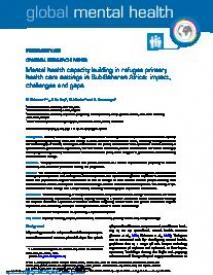Mental health capacity building in refugee primary health care settings in Sub-Saharan Africa : impact, challenges and gaps
Background. In 2015, the United Nations High Commissioner for Refugees started a process of mental health capacity building in refugee primary health care settings in seven countries in Sub-Saharan Africa, ultimately aiming to decrease the treatment gap of mental, neurological and substance use (MNS) conditions in these operations. In 2015 and 2016, a specialized non-governmental organization, the War Trauma Foundation, trained 619 staff with the mental health gap action programme (mhGAP) Humanitarian Intervention Guide (HIG), a tool designed to guide clinical decision making in humanitarian settings.
Methods. This paper describes the results of a process evaluation of a real-life implementation project by an external consultant, one and a half years after starting the programme.
Results. The mhGAP-HIG capacity building efforts had various effects contributing to the integration of mental health in refugee primary health care. Facility-and community-based staff reported strengthened capacities to deliver mental health and psychosocial support interventions as well as changes in their attitude towards people suffering from MNS conditions. Service delivery and collaboration amongst different intervention levels improved. The scarcity of specialized staff in these settings was a major barrier, hindering the setting-up of supervision mechanisms.
Conclusion. Mental health training of non-specialized staff in complex humanitarian settings is feasible and can lead to increased competency of providers. However, capacity building is a ‘process’ and not an ‘event’ and mhGAP trainings are only one element in a spectrum of activities aimed at integrating mental health into general health care. Regular supervision and continuing on-the-job training are in fact critical to ensure sustainability.
In: Global Mental Health, eISSN 2054-4251 | 5 | e28
https://doi.org/10.1017/gmh.2018.19


